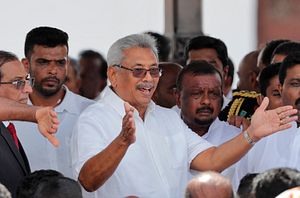Elections in Sri Lanka last month have put the small Indian Ocean country back in the spotlight.
On November 18, Gotabaya Rajapaksa was sworn in as the eighth president of Sri Lanka.
Soon afterwards, his brother Mahinda Rajapaksa, the former president who, over his 10-year term, oversaw the end to the country’s bloody civil war, was sworn in as prime minister.
The Rajapaksa brothers have seized the reins of power, riding high on a tide of national security concerns and ethnic polarization.
After the catastrophic Easter Sunday bombings this year, Gotabaya quickly positioned himself as the law-and-order, national security hawk.
Combined with the Rajapaksas’ long-standing reputation for tapping into nationalist support from the country’s majority Sinhala population, his victory over his rivals was decisive.
Under the Rajapaksas, the fate of Sri Lanka’s Tamil and Muslim minorities, in particular, have become a subject of concern overseas. A surge of nationalism can be expected – with possible ramifications for the country’s foreign affairs.
Sri Lanka’s new government also appears to be tapping into its nationalistic instincts when it comes to the matter of the Hambantota port.
Long the posterchild for China’s “debt trap” diplomacy under the Belt and Road Initiative, Hambantota has been held up as a cautionary tale for other would-be borrowers.
Under the presidency of Maithripala Sirisena, Colombo proved unable to continue servicing its debts to the Chinese state-owned enterprise that had been involved the port’s development.
As a result, the Sri Lankan government chose to pursue a debt-equity swap, transferring ownership of the strategically located port to China Merchant Port Holdings.
This arrangement was finalised in July 2017 and came under fire in Gotabaya’s election manifesto. For instance, that document noted that “Hambantota port is a national asset and was defined as a strategic asset by us previously, and the intention was never to sell or lease the port for 99 years.”
Now, with their hands back on the levers of power, the Rajapaksa brothers may have big plans for Hambantota.
Recently, an adviser to Mahinda, who initiated the original collaboration with China on Hambantota back in 2007, said in no uncertain terms that Sri Lanka would like China to “give it back”.
In this sense, Sri Lanka’s change of government represents a familiar pattern, where a new, democratically elected leadership questions prior arrangements with China.
In 2018, both Pakistani Prime Minister Imran Khan and Malaysian Prime Minister Mahathir Mohamed did just that on taking office, and the Maldives is also questioning a December 2017 free-trade agreement with China.
In India, the return of the Rajapaksas had been seen as a negative development. After all, it was during Mahinda’s presidency that Colombo drifted decisively away from New Delhi and began exploring a range of projects with China.
By the time Xi Jinping formally announced the Belt and Road Initiative in late-2013, Sri Lanka was already an important partner for Beijing.
Under the Rajapaksa brothers, Sri Lankan’s geopolitical position between India and China appears to be a shade of grey.
The notion that Colombo would “tilt” decisively toward one or the other oversimplifies Sri Lankan agency.
Fundamentally, it appears that Gotabaya is out to position himself as adopting a “Sri Lanka first” foreign policy, with the objective of extracting maximum value from China, India, and other major regional powers. (For example, during his inaugural trip to India as president, India announced a $400 million loan.)
The fate of Hambantota may not change drastically. Sri Lanka’s sovereign obligations on the 2017 agreement will be difficult to revisit. The fact that Gotabaya has brought up the issue in his first 100 days in office suggests that it will remain on the agenda.
Consultations with Beijing are unlikely to be held publicly and may already be under way. We’ll know soon enough if Sri Lanka will walk the walk on taking “back” Hambantota.
A version of this article first appeared in the South China Morning Post. It is republished here with kind permission.

































